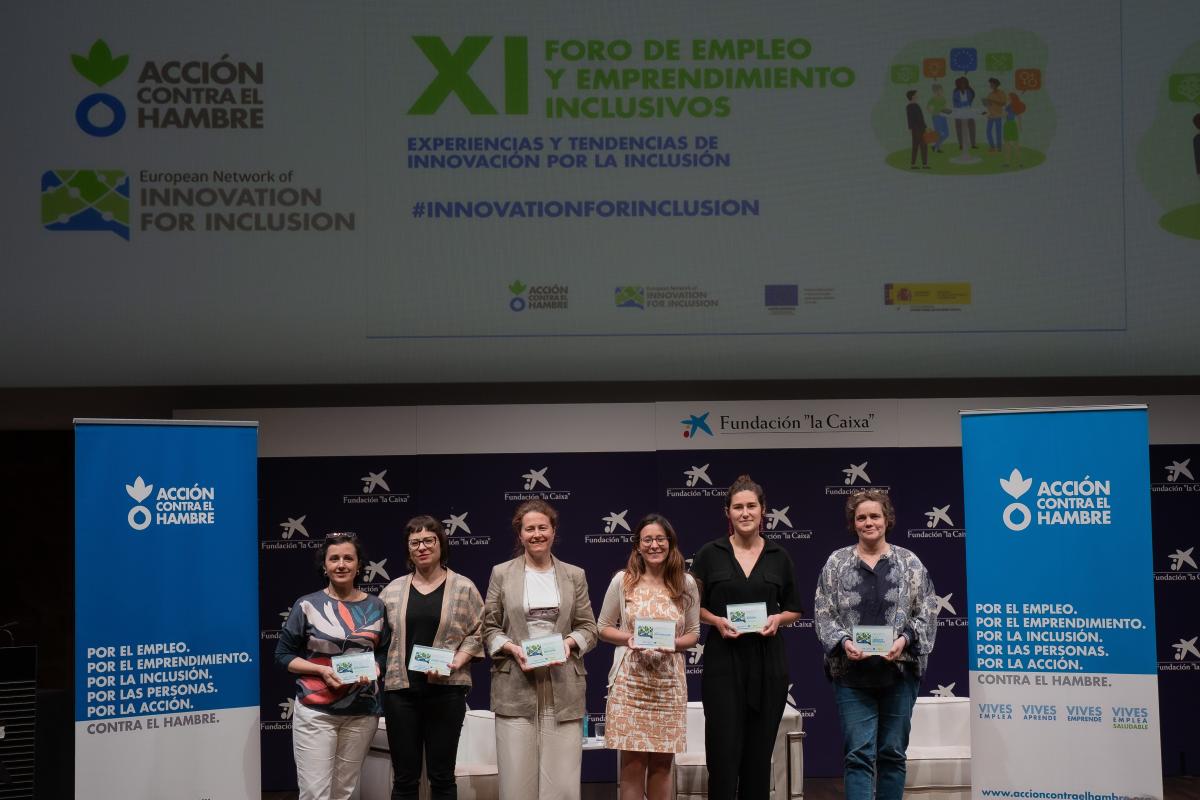PRENSA
Social innovation, key to advancing systemic social changes

- The XI Forum for Inclusive Employment and Entrepreneurship, organized by the European Network of Innovation for Inclusion of Action Against Hunger and held last Friday in Madrid, has publicized the latest trends -from financing to public policies- in matter of social innovation that come from Europe and affect Spain.
- The new European Social Fund Plus (ESF+) has a budget of 99.300 billion euros for 2021-2027 and aims to achieve high levels of employment and greater social protection, as well as train qualified and resilient people, prepared to face the transition to a green and digital economy.
How to position social innovation as the path to advance systemic social changes? During the 11th Inclusive Employment and Entrepreneurship Forum held in the CaixaForum auditorium last Friday, some answers were given: innovation is at the center of both public financing and public policies, which is why more and more is being granted importance and more is required of social entities in this regard.
At the event, which welcomed representatives of various Spanish and European institutions involved in public social policies, the keys to financing projects related to employability, entrepreneurship and inclusion were shared, detailing financial instruments such as the European Social Fund Plus (ESF+), and its new programming period, such as the grants that are managed from the Ministry of Social Rights and the 2030 Agenda.
The forum also addressed the future implementation, both in Europe and in Spain, of the Competence Centers for Social Innovation - centers in the Member States of the European Union for knowledge and capacity building, to support innovation projects so that they make themselves known, creating synergies - that will help social organizations to program and carry out actions in this area. Since this center has been designed to be a reality in our country in the coming years, the proposal for its implementation by the Ministry of Social Rights and Agenda 2030 was advanced, and in what way it will benefit these entities.
The general director of Acción contra el Hambre, Olivier Longué, opened the forum highlighting the importance of social innovation to achieve a greater impact on people. In this sense, he stressed: “Since the beginning of Action Against Hunger we have had innovation as part of our DNA because providing new solutions is a constituent element of our social value. We dedicate R&D resources to create diagnosis, strategic decision and management systems and, above all, new work methodologies to face the permanent and changing challenge of vulnerability and social inclusion”.
For her part, the head of the Employment, Skills and Social Policies Unit for Spain and Malta of the General Directorate for Employment, Social Affairs and Inclusion of the European Commission, María Iglesia, wanted to confirm the importance of social innovation on the agenda of the European Union, as well as encourage to continue working so that there is "an exchange of experiences between autonomous communities and other countries" with the aim of having greater inspiration.
At the same time, he highlighted the value of public-private partnerships when it comes to achieving social equality in Europe, something that makes possible to develop the new ESF+. "Innovation has to lead to participation, it must include the actors and make them participate so that they are part of the process," said María Iglesia.
"To respond to social challenges (demographics, inequality, technological disruption and climate transition), the capacity we have to innovate is our main hope," stressed the managing partner of Red2Red Consultants and member of the Economic Affairs Advisory Council of the Ministry of Economy and Digital Transition of the Government of Spain, José Moisés Martín Carretero, while proposing a model made up of ten levers for change: 1) the digital revolution; 2) citizenship as an expert; 3) the redesign of public policies putting the citizenry at the center; 4) the experimentation of public policies; 5) internal reengineering; 6) the feminization of government action; 8) transformative alliances; 9) the new metric levers and 10) the change of culture and the promotion of systemic thinking.
The event closed with the award ceremony of the good practices of the European Network of Innovation for Inclusion -a space for the exchange of knowledge, alliances and scaling of innovative practices-. The awarded good practices are:
El acto se clausuró con la entrega de los premios a las buenas prácticas de la Red Europea de Innovación por la Inclusión -un espacio de intercambio de conocimiento, alianzas y escalación de prácticas innovadoras-, que recayeron en:
- Socio-labour inclusion
- Winner: FACIAM network and its good practice “Futuro&Co”.
- Finalist: International Professionals Finland, with the finalist good practice “Degree AMPLIFY”.
- Finalist: Good practice finalist “BATZEN”, from the entity Zabalduz.
- Inclusive Entrepreneurship
- Winner: Le LABA and its good practice “Creative Invisibles”.
- Finalist: San Ezequiel Moreno Foundation, with “HILVANA”.
- Finalist: CIAPE, Italian Center for Lifelong Learning, with the good practice “Go-Circular”.
The full program of the forum can be consulted here.
Registro de periodistas
Contacto de prensa
Daniel Faria | dafaria@accioncontraelhambre.org
659 183 776
Nora Benito | nbenito@accioncontraelhambre.org
682 63 12 96
Responsable de comunicación
Pedro Javaloyes | pjavaloyes@accioncontraelhambre.org
Twitter
@acontraelhambre